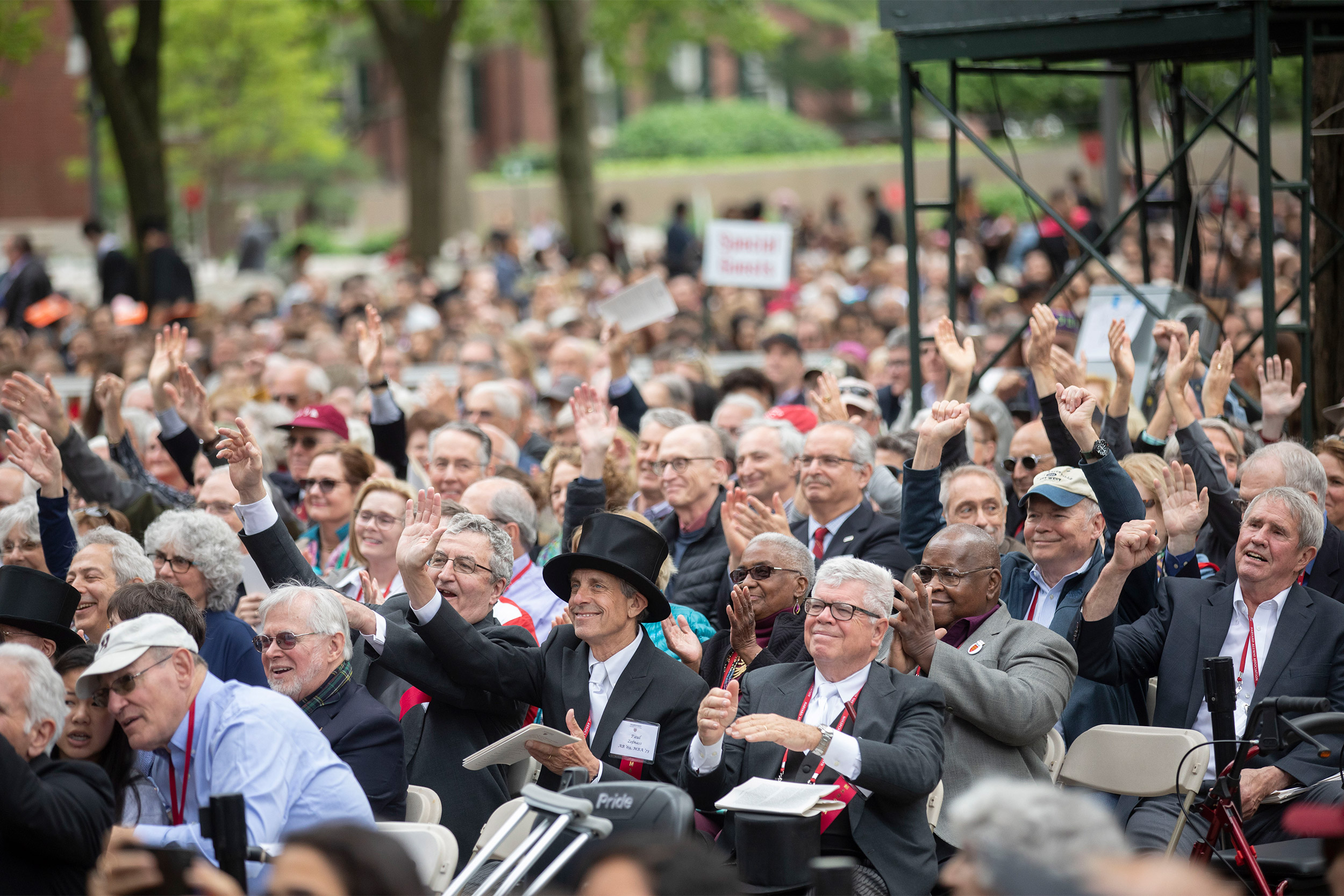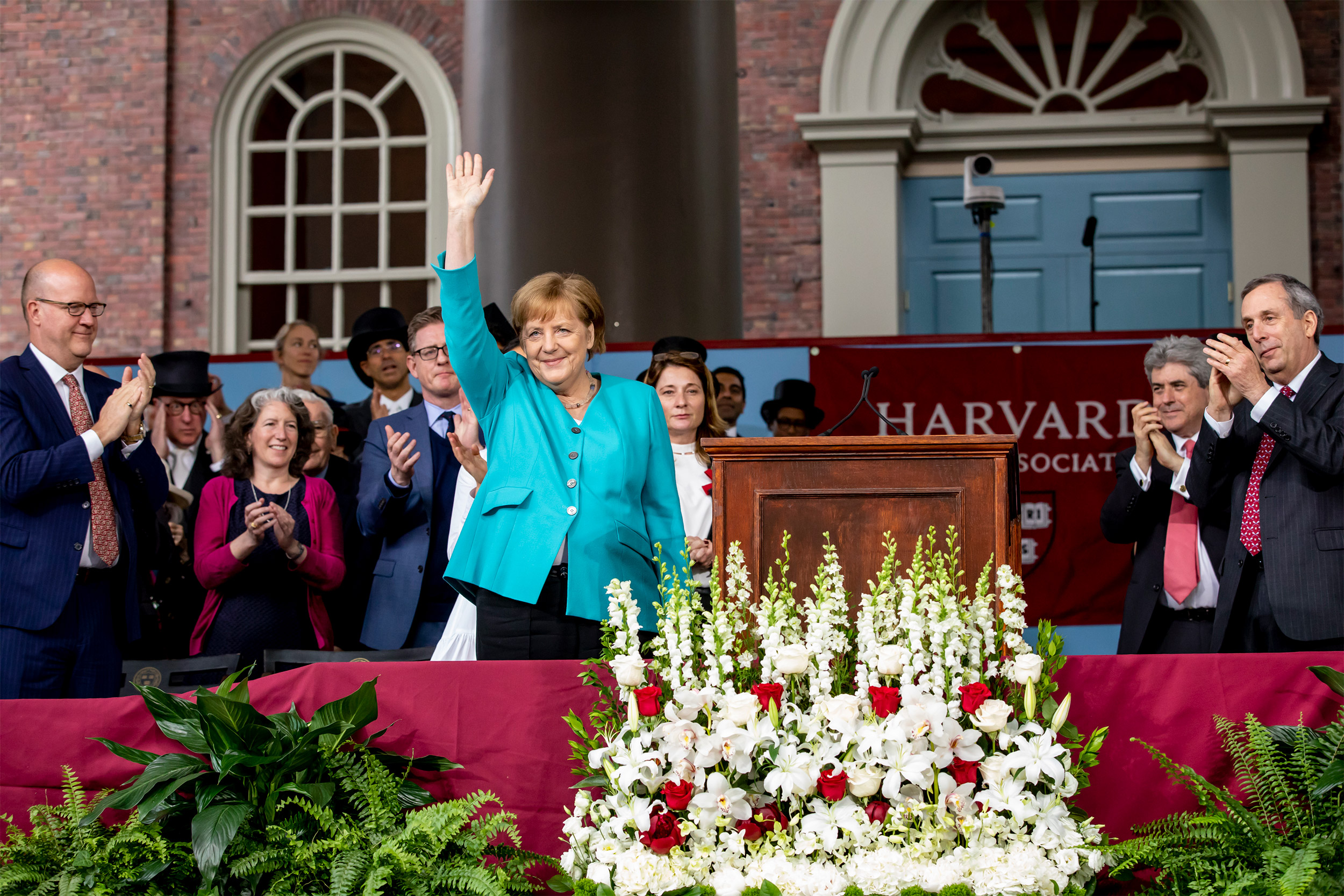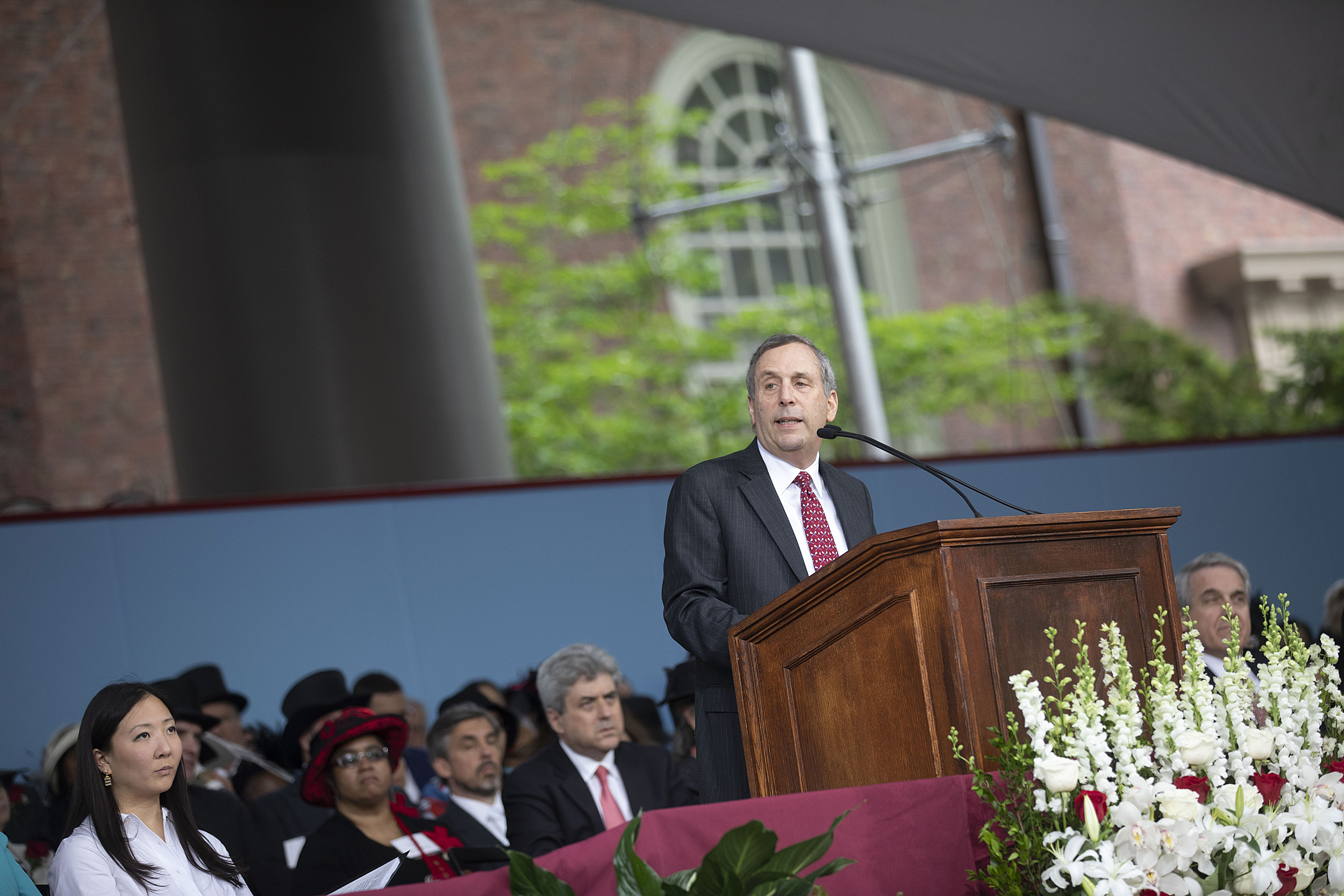風蕭蕭_Frank
以文會友默克爾勉勵畢業生:打破束縛你的高牆
德國總理在畢業典禮上敦促畢業生“擁抱新的開始”
https://news.harvard.edu/gazette/story/2019/05/at-harvard-commencement-merkel-tells-grads-break-the-walls-that-hem-you-in/
Christina Pazzanese 哈佛大學特約撰稿人 2019年5月30日
周四下午,哈佛大學2019屆畢業生最後一次齊聚畢業典禮,德國總理安格拉·默克爾告誡畢業生們,不要把任何事情視為理所當然。
“我們的個人自由並非天賜之物。民主並非理所當然。和平與繁榮亦非理所當然,”主講人默克爾說道。“但隻要我們打破束縛我們的高牆,隻要我們走出去,勇於擁抱新的開始,一切皆有可能。”
默克爾主要用德語講話,她的講話不時被翻譯成英文。她講述了自己非凡的人生經曆:35歲時,她作為共產主義東德的一名科學家,在新統一國家的政治體係中一路晉升,最終成為德國首位女總理,並且,許多分析人士認為,她是自由世界的領袖。她敦促應屆畢業生勇於冒險,深思熟慮後再做決定,並堅守核心價值觀。
她回憶起每天下班回家時路過柏林牆的沮喪。那道鋼筋水泥的屏障,將這座城市、這裏的人民、這裏的家庭,包括她自己的家庭,分隔開來。
“每天,我都不得不在最後一刻放棄自由,”在哈佛校友會(HAA)年會上,在三百周年劇院,麵對擠滿觀眾的畢業生和校友,她發表了長達35分鍾的演講,講述了自己的早年經曆。
人潮湧動的三百周年紀念劇院
三百周年紀念劇院人潮湧動,觀眾紛紛前來迎接德國總理安格拉·默克爾。
Kris Snibbe/哈佛大學攝影師
“柏林牆限製了我的發展機遇。它確實擋住了我的去路。然而,有一件事是這堵牆多年來無法做到的:它無法限製我的內心世界、我的個性、我的想象力、我的夢想和渴望。”
事實上,1989年,隨著共產主義的垮台,柏林牆意外倒塌,不僅結束了德國的分裂,也為默克爾帶來了新的機遇,包括成為一個她從未想過自己能成為的人。“一扇門突然打開了”,“我得以跨越這道邊界,走進廣闊的天地,”她回憶道。
她告訴聽眾,從那段改變人生的經曆中,她學到的是“任何看似一成不變或不可改變的事情都可能改變”,他們應該以同樣的方式去麵對生活中不可避免的障礙,無論是物質的、社會的、智力的還是文化的。
在晨練期間,這位德國總理因其在世界舞台上的堅定領導力以及對民主理想和國際合作的堅定捍衛而被授予榮譽法學博士學位。
與其說是政治演講,不如說是一場傳統的畢業典禮演講,默克爾的講話確實觸及了幾個熱門的外交政策問題。她強調了歐盟和多邊主義的益處,以及與美國建立“基於民主價值觀和人權”的跨大西洋關係的重要性,以及——在歐洲準備迎接與美國可能發生的貿易衝突之際——國際自由貿易帶來的共同繁榮。
德國總理安格拉·默克爾向人群揮手致意。
安格拉·默克爾35分鍾的演講在一片掌聲中落下帷幕。
羅斯·林肯/哈佛攝影師
盡管默克爾擔任德國總理14年來一直深受歡迎,但她所在的中右翼政黨——基督教民主聯盟——在上周的歐洲議會選舉中,其選民支持率卻出現下滑(轉向極右翼和極左翼政黨)。在一次電視采訪中,默克爾表示,展現民主的行動是應對歐洲日益興起的民粹主義和反民主運動所帶來的危險的最佳方式,同時也承認氣候變化如今已成為一個決定性的政治議題,尤其對德國年輕人而言。
或許正是出於對這一現實的認同,將於2021年卸任的默克爾承諾,她將“竭盡所能”確保德國在2050年實現氣候中和。
在這個急躁和追求即時滿足的時代,默克爾敦促畢業生和校友們思考他們做出決策的原因,尤其是在科技領域。她說,作為總理,她經常捫心自問,自己做某件事是因為這件事正確,還是因為它可能。
“你們也需要不斷捫心自問,”她說。“是我們為科技製定規則,還是科技決定了我們的行為?”
作為一名深思熟慮的領導者,默克爾建議畢業生們在做決定時要多花些時間,這個過程需要他們在待人處事上展現“勇氣和真誠”。
“或許最重要的是,它呼籲我們對自己誠實。還有什麽地方比這裏更適合開始這樣做呢?這裏聚集了來自世界各地的眾多年輕人,他們秉持著真理的準則來學習、研究和討論我們時代的問題。這就要求我們不能把謊言說成真理,也不能把真理說成謊言。”她說道,全場起立鼓掌。
臨別之際,默克爾建議畢業生們走向世界,“打破無知和狹隘的壁壘,因為沒有什麽必須一成不變。”
校長拉裏·巴考在下午的活動中發言。
校長拉裏·巴考回憶了他領導哈佛大學第一年的精彩瞬間。Kris Snibbe/哈佛攝影師
在給校友的報告中,哈佛大學校長拉裏·巴考(1976屆法學博士、公共政策碩士、哲學博士) 1978年,巴考回憶了他領導哈佛大學第一年的一些亮點,走訪了美國和亞洲的各個城市,向致力於公共服務的校友和社區領袖學習。他談到了如何結識學生,包括即將畢業的大四學生,以及哈佛大學劍橋校區和波士頓校區的教職員工,他們以各種不同的方式致力於改變世界、服務公眾利益。
巴考還指出了我們這個時代的“動蕩”,致命暴力事件頻發,尤其是針對猶太人、穆斯林和基督教信徒的暴力事件;性侵犯和性騷擾的持續存在;以及氣候變化和極端天氣帶來的生存威脅。
“誠然,世界上有很多事情確實困擾著我們。但還有更多的事情讓我們充滿希望,”巴考說道。“而這種希望的精神——既願意正視世界的現狀,又願意思考如何讓它變得更好——在很多方麵,正是這所大學的精神所在,我相信,這種精神將我們所有人緊密聯係在一起。”
巴考表示,迄今為止的所見所聞讓他深受啟發。
“這就是這所大學的力量——而非它的品牌,而非我們的建築,亦非我們的浮誇和排場,”他說道。“這所大學的力量在於它的人民——他們的抱負,他們的成就,他們多元化的背景、經驗和思想,他們超越自我的渴望,以及他們為他人服務的奉獻精神。”
“所以,是的,我是一個樂觀主義者。我之所以樂觀,是因為我生活和工作在你們所有人之中,因為我看到你們所做的一切,因為我知道你們擁有無限的潛力。”
哈佛大學校友會主席 Margaret M. Wang(2009屆)熱烈歡迎新畢業生加入校友行列,向參加校友會的裏程碑式校友聚會致意,並宣布了監事會和哈佛大學校友會董事會的選舉結果。
此外,Bacow 還向校友 Teresita Alvarez-Bjelland(76屆,工商管理碩士,79屆)、Dan H. Fenn Jr.(44屆,文學碩士,72屆)和 Tamara Elliott Rogers(74屆)頒發了哈佛獎章,以表彰他們多年來對哈佛大學的傑出貢獻和服務。
Merkel advises graduates: Break the walls that hem you in
At Commencement, German chancellor urges them 'to embrace new beginnings’
Christina Pazzanese Harvard Staff Writer May 30, 2019
As Harvard’s Class of 2019 gathered for the last time at Commencement Thursday afternoon, German Chancellor Angela Merkel cautioned the new graduates to take nothing for granted.
“Our individual liberties are not givens. Democracy is not something we can take for granted. Neither is peace, and neither is prosperity,” said Merkel, the main speaker. “But if we break down the walls that hem us in, if we step out into the open and have the courage to embrace new beginnings, everything is possible.”
Speaking primarily in German, with her remarks periodically translated into English, Merkel drew from her own remarkable life story as a 35-year-old scientist in communist East Germany who rose through the ranks of the newly unified state’s political system to become Germany’s first woman chancellor and, many analysts would argue, leader of the free world. She urged the new graduates to take risks, make thoughtful decisions, and hold onto core values.
She recalled her frustration at walking past the Berlin Wall every day on her way home from work. It was a barrier of steel and concrete that divided the city, its people, and its families, including her own.
“Every day, I had to turn away from freedom at the last minute,” she said of her early years, during a 35-minute speech to the graduates and alumni during the annual meeting of the Harvard Alumni Association (HAA) before an overflow crowd at Tercentenary Theatre.
 An overflow crowd at Tercentenary Theatre greets German Chancellor Angela Merkel.
An overflow crowd at Tercentenary Theatre greets German Chancellor Angela Merkel.
“The Berlin Wall limited my opportunities. It quite literally stood in my way. However, there was one thing which this wall couldn’t do through all those years: It couldn’t impose limits on my inner thoughts, my personality, my imagination, my dreams and desires.”
Indeed, the wall’s unexpected fall in 1989 with the collapse of communism not only ended a divided Germany, it presented Merkel with new possibilities, including a chance to become someone she never imagined she could be. “A door suddenly opened” and “I was able to cross this border and venture out in to the great wide open,” she recalled.
What she learned from that transformative experience, she told the audience, was that “anything that seems set in stone or inalterable can indeed change,” and that they ought to approach the walls they’ll inevitably encounter in their lives, whether physical, social, intellectual, or cultural, in similar fashion.
During Morning Exercises, the German chancellor was awarded an honorary doctor of laws degree for her resolute leadership on the world stage and her unwavering defense of democratic ideals and international cooperation.
More a traditional commencement speech than a political address, Merkel’s remarks did touch on several topical foreign-policy issues. She touted the benefits of the European Union and multilateralism, the importance of a transatlantic relationship with the U.S. that is “based on democratic values and human rights,” and — as Europe braces for a possible trade clash with the U.S. — mutual prosperity as a result of international free trade.
 Angela Merkel’s 35-minute speech ends on a wave of applause.
Angela Merkel’s 35-minute speech ends on a wave of applause.
Despite her longstanding popularity as chancellor for 14 years, Merkel’s own center-right party, the Christian Democratic Union, saw an erosion of voter support (to parties on both the far right and far left) in last week’s elections to the European Parliament. In a television interview, Merkel said showing democracy in action was the best way to confront the dangers posed by Europe’s rising populist, anti-democratic movements, while conceding that climate change is now a decisive political issue, particularly for young Germans.
Perhaps in a nod to that reality, Merkel, who will leave office in 2021, pledged that she would “do everything in my power” to ensure that Germany achieves climate neutrality by 2050.
In this era of impatience and instant gratification, Merkel urged the graduates and alumni to consider why they’re making decisions, particularly around technology. As chancellor, she said, she often asks herself whether she’s doing something because it is right or because it is possible.
“That is something you, too, need to keep asking yourselves,” she said. “Are we laying down the rules for technology, or is technology dictating how we act?”
A deliberative leader, Merkel suggested graduates take more time when thinking through decisions, a process that will require “courage and truthfulness” in how they deal with others.
“And perhaps most importantly, it calls for us to be honest with ourselves. What better place to begin to do so than here, in this place where so many young people from all over the world come to learn, research, and discuss the issues of our time under the maxim of truth? That requires us not to describe lies as truth and truth as lies,” she said, to a standing ovation.
In parting, Merkel advised graduates to go out into the world and “tear down walls of ignorance and narrow-mindedness, for nothing has to stay as it is.”
 President Larry Bacow recalls highlights of his first year leading the University. Kris Snibbe/Harvard Staff Photographer
President Larry Bacow recalls highlights of his first year leading the University. Kris Snibbe/Harvard Staff Photographer
In his report to alumni, Harvard President Larry Bacow, J.D. ’76, M.P.P. ’76, Ph.D. ’78, recalled some highlights of his first year leading the University, traveling to cities across the U.S. and Asia and learning from alumni and community leaders committed to public service. He talked about getting to know students, including graduating seniors, as well as faculty and staff on Harvard’s Cambridge and Boston campuses who work in many different ways to change the world and serve the public good.
Bacow also noted the “volatility” of our times, which have been marred by episodes of deadly violence, especially against Jewish, Muslim, and Christian worshippers; the persistence of sexual assault and harassment; and the existential threat posed by climate change and extreme weather.
“To be sure, there is much in the world that rightly troubles us. But there is even more that gives us cause for hope,” said Bacow. “And that spirit of hope — the willingness both to see the world as it is and to consider how we can help make it better — is in many ways the spirit that defines this University and, I believe, joins us all together.”
Bacow said he has been inspired by what he has witnessed thus far.
“That is the power of this institution — not its brand, not our buildings, not our pomp and circumstance,” he said. “This University is its people — their aspirations, their achievements, their diversity of background and experience and thought, their desire to see beyond themselves and their devotion to serving others.
“So yes, I am an optimist. I am an optimist because I live and work among all of you, because I see what you do and because I know the boundless potential of what you can do.”
HAA President Margaret M. Wang ’09 welcomed the new graduates into the alumni fold, greeted the milestone reunion classes in attendance, and announced the results of the Board of Overseers and HAA Board of Directors elections.
Also, Bacow presented Harvard Medals to alumni Teresita Alvarez-Bjelland ’76, M.B.A. ’79, Dan H. Fenn Jr. ’44, A.M. ’72, and Tamara Elliott Rogers ’74 for their outstanding contributions and service to the University over many years.




